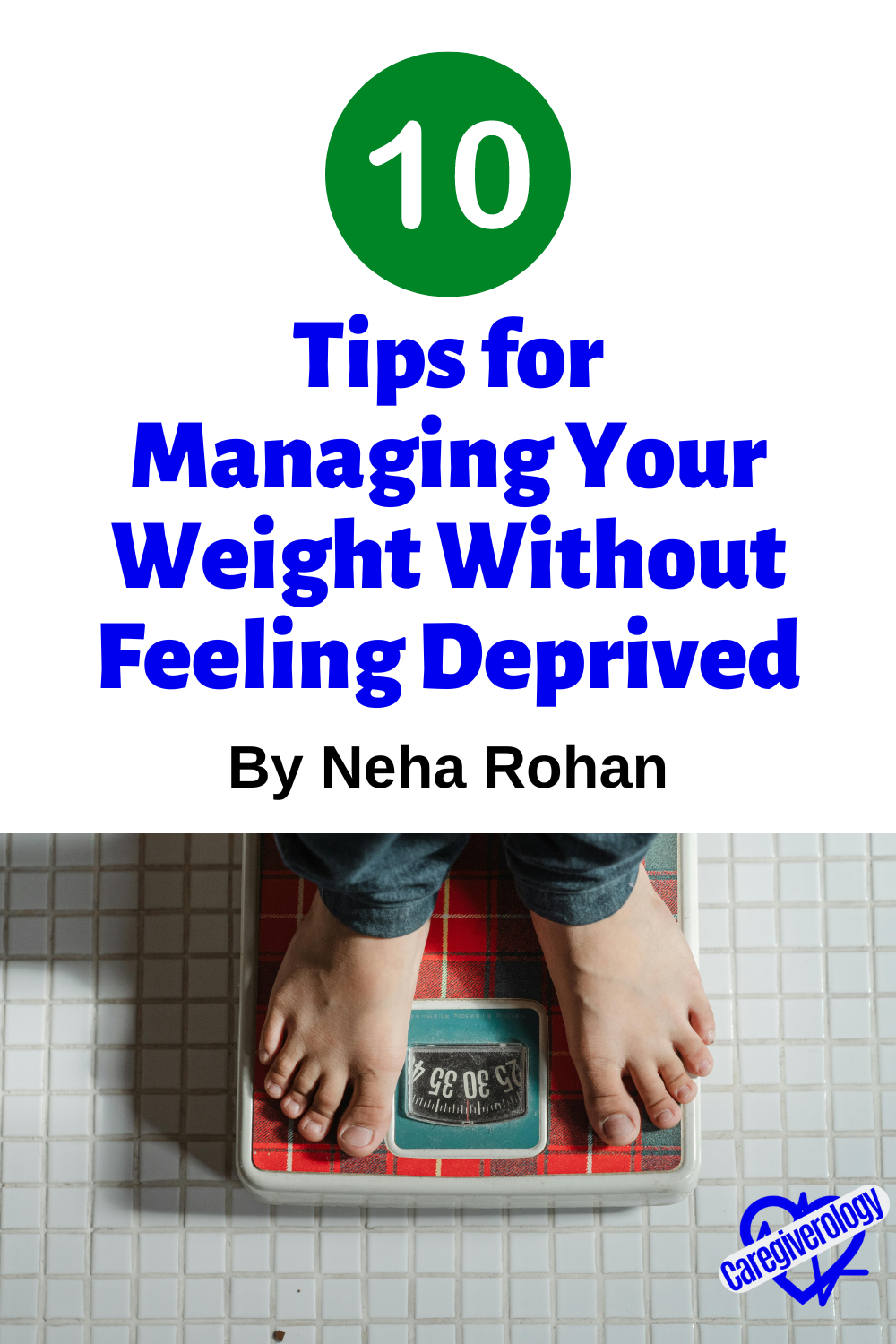10 Tips for Managing Your Weight Without Feeling Deprived

When it comes to losing weight, the battle isn't just against the scale but also against hunger and cravings. However, you don't have to feel deprived to manage your weight successfully. By adopting smarter strategies, you can satisfy your nutritional needs and taste buds, all while keeping your calorie count in check.
Let's explore ten practical tips that can help you balance enjoying life with achieving your weight management goals.
1 2 3 4 5 6 7 8 9 10 Conclusion
1. Eat Balanced Meals
Balanced meals are your best defense against the dreaded diet downfall: feeling hungry soon after eating. By ensuring that each meal includes a good mix of proteins, fats, and carbohydrates, you can maintain a steady energy level throughout the day. Proteins like chicken, fish, and legumes, healthy fats from avocados or olive oil, and complex carbohydrates from whole grains or sweet potatoes will keep you fuller for longer.
This balance not only sustains your energy but also helps stabilize your blood sugar levels, reducing those sudden hunger spikes.
2. Track Your Calorie Intake
One of the most effective ways to manage your diet without feeling deprived is by keeping an eye on what you actually consume. Using a tool like Calorie Details can demystify the numbers behind your nutrition. This tool allows you to easily track the calorie content and nutritional information of the foods you eat, helping you make informed decisions about portion sizes and food choices. For instance, knowing that a piece of chocolate cake has twice the calories of a chocolate-dipped strawberry might encourage choosing the latter as a sweet treat.
3. Prioritize High Fiber Foods
Fiber is a powerhouse when it comes to feeling satiated. High-fiber foods like fruits, vegetables, legumes, and whole grains take longer to digest, thus providing a feeling of fullness for a more extended period. Start your day with oatmeal or a high-fiber cereal, snack on fruits or veggies, and choose whole-grain options for bread and pasta.
Not only does fiber help with digestion and prevent constipation, but it also keeps you feeling full, which means less grazing on high-calorie snacks.
4. Stay Hydrated
Drinking enough water is a simple yet effective strategy for weight management. Often, our bodies confuse thirst with hunger, leading us to eat when we actually need fluids. By staying hydrated, you can ensure that you only eat when you truly need to. Aim for 8-10 glasses of water a day, and try to drink a glass before meals, which can help prevent overeating. If you find plain water too bland, add a slice of lemon, lime, or cucumber for a refreshing twist.
5. Plan Your Meals and Snacks
Planning is a crucial component of diet management. By preparing your meals and snacks in advance, you can avoid the temptation of easy, often unhealthy options. Dedicate a time each week to meal prep—cook batches of protein, chop vegetables, or prepare whole grains. Pack these items in containers for easy access throughout the week.
Planning your snacks is equally important; keep healthy options like nuts, yogurt, or fruit close at hand. This way, you're prepared whenever hunger strikes, and you're less likely to reach for a quick, calorie-dense fix.
6. Choose Healthy Fats
Incorporating healthy fats into your diet is essential for long-term satiety and overall health. Foods rich in monounsaturated and polyunsaturated fats, like nuts, seeds, avocados, and fatty fish such as salmon, provide essential nutrients and help you feel full longer. Unlike trans fats and saturated fats, which can harm your heart health, these fats contribute to a healthy heart and stabilize your mood.
Instead of completely avoiding fats, select the right kinds and use them wisely in your meals. A handful of almonds or a few slices of avocado in your salad can make a substantial difference in how full you feel throughout the day.
7. Implement Mindful Eating
Mindful eating is about being present and engaged with your eating experiences. It allows you to enjoy your food more fully and helps prevent overeating. Start by eating slowly and without distractions like TV or smartphones. Pay attention to the taste, texture, and aroma of your food, and listen to your body's hunger and fullness cues.
This practice can help you appreciate your meals more and recognize when you are satisfied, reducing the likelihood of overeating.
8. Allow for Controlled Indulgences
Deprivation can lead to cravings and, ultimately, binge eating. Allowing yourself controlled indulgences can help you maintain a balanced diet without feeling like you’re missing out. Plan for occasional treats in your diet and enjoy them without guilt. For example, if you love chocolate, allow yourself a few squares of dark chocolate each evening.
By incorporating small amounts of your favorite foods, you're less likely to feel deprived and more likely to stick with your healthy eating plan in the long run.
9. Get Active
Physical activity is a crucial component of weight management. Not only does exercise burn calories, but it also helps build muscle, which can boost your metabolism. Find activities you enjoy, whether it’s walking, cycling, swimming, or dancing, and try to integrate them into your daily routine.
Even 30 minutes of moderate exercise a day can make a significant impact on your overall health and help you manage your weight more effectively. Remember, the goal is to find joy in being active, which will help you stay consistent with your physical activity.
10. Seek Support
Weight management can be challenging when you're going it alone. Having a support system can significantly enhance your motivation and commitment. Connect with friends who share your health goals, join a fitness class, or consider a support group. Sharing your struggles and successes with others can provide the encouragement you need to stick with your healthy habits.
Conclusion
Managing your weight effectively doesn’t mean you have to feel constantly deprived or hungry. By employing these ten strategies, you can create a balanced approach to eating and living that supports your weight goals without sacrificing your joy and satisfaction. Eat balanced meals, keep track of what you eat, fill up on fiber, stay hydrated, plan ahead, choose healthy fats, eat mindfully, indulge wisely, stay active, and seek support. Each of these elements plays a crucial role in developing a sustainable lifestyle that fosters both physical health and mental well-being.
Thank you Neha Rohan for contributing this article.
Guest Articles Written for Caregiverology
From 10 Tips for Managing Your Weight Without Feeling Deprived to Home
Recent Articles
-
How to Plan for Aging: Financial, Health, and Lifestyle Considerations
Mar 29, 25 12:40 PM
Did you know that 70% of people over 65 will need some form of long-term care? Yet, many delay planning until it’s too late. Aging is inevitable, but how we experience it depends on preparation. -
Speech Disorders: How to Know When It's Time to See a Professional
Mar 27, 25 07:05 AM
When it comes to human interaction, we need to be able to communicate effectively. -
Who Provides What? The Distinct Duties of Nurses and Caregivers
Mar 26, 25 07:37 PM
When it comes to healthcare, the roles of nurses and caregivers are often misunderstood. While both are essential in providing support and care, their responsibilities, training, and the level of care…





New! Comments
Have something to say about what you just read? Leave a comment in the box below.